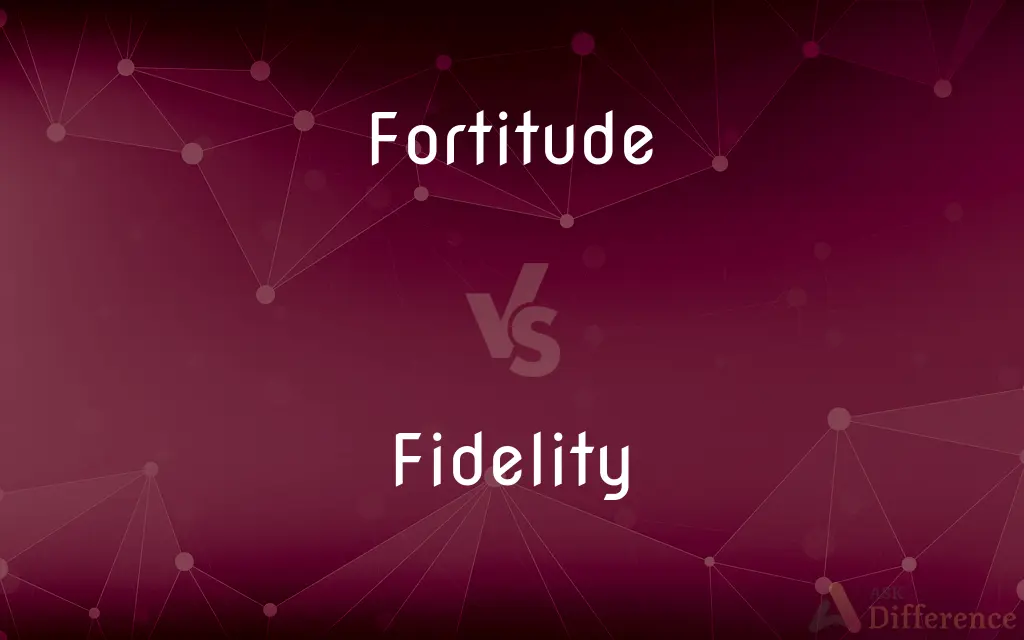Fortitude vs. Fidelity — What's the Difference?
Edited by Tayyaba Rehman — By Maham Liaqat — Updated on April 24, 2024
Fortitude refers to mental and emotional strength in facing adversity, while fidelity denotes faithfulness or loyalty, particularly in relationships or commitments.

Difference Between Fortitude and Fidelity
Table of Contents
ADVERTISEMENT
Key Differences
Fortitude is a personal virtue that involves courage, resilience, and the endurance to confront challenges without giving way to fear. It is about one's strength in difficult situations, both psychologically and emotionally. On the other hand, fidelity is a commitment to loyalty and trustworthiness, often applied in the context of relationships, agreements, or principles. It involves staying true to one's promises or duties.
Individuals demonstrate fortitude through their persistence in overcoming obstacles and their ability to remain steadfast in the face of adversity. This quality is crucial in personal development and success, as it helps one to navigate life's challenges. Conversely, fidelity is expressed through loyalty and integrity in one's actions and decisions, ensuring that one's behavior aligns with ethical standards or personal commitments.
While fortitude primarily deals with inner strength and the capability to withstand life's pressures, fidelity focuses on the aspect of faithfulness and the adherence to moral convictions or emotional bonds with others. Fortitude helps a person to survive and thrive during hard times, whereas fidelity ensures that relationships and societal norms are upheld.
Fortitude can be seen as a trait that helps individuals adapt and overcome, pushing them towards growth and self-improvement. In contrast, fidelity is essential for building and maintaining trust and stability in personal and professional relationships. Both virtues, though distinct, often intersect where enduring commitment or adherence to principles is required.
In broader societal contexts, fortitude is celebrated as a quality of leaders and heroes who face daunting challenges without losing heart. Fidelity, however, is cherished in social, familial, and professional relationships, where the consistency of character and reliability build strong, lasting bonds.
ADVERTISEMENT
Comparison Chart
Definition
Courage in pain or adversity
Faithfulness and loyalty
Primary Context
Personal adversity and challenges
Relationships, commitments
Psychological Aspect
Resilience, endurance, bravery
Integrity, trustworthiness, commitment
Social Importance
Key in personal development and overcoming hardship
Essential for trust and stability in relationships
Example of Use
Demonstrating fortitude in recovering from a setback
Remaining faithful to a partner or a cause
Compare with Definitions
Fortitude
Mental and emotional strength in facing difficulty.
She showed remarkable fortitude during the legal proceedings.
Fidelity
Accuracy in details, exactness.
The replica was made with high fidelity, mirroring the original artifact precisely.
Fortitude
Courage in pain or adversity.
Despite numerous setbacks, her fortitude never wavered.
Fidelity
Loyalty and faithfulness in personal relationships.
They celebrated their 50th anniversary, marking half a century of mutual fidelity.
Fortitude
A trait associated with resilience and bravery.
The soldiers' fortitude kept their spirits high despite the hardships.
Fidelity
Faithfulness to obligations, duties, or commitments.
His fidelity to his employer was recognized during the retirement ceremony.
Fortitude
Endurance of pain or adversity without despair.
His fortitude in battling cancer inspired everyone around him.
Fidelity
Essential for building trust in various relationships.
Fidelity in friendships and business partnerships is crucial for long-term success.
Fortitude
Often celebrated in leaders and heroes.
Historical narratives often highlight the fortitude of revolutionary leaders.
Fidelity
Adherence to truth or authenticity.
The journalist's fidelity to factual reporting gained him a respected reputation.
Fortitude
Strength of mind that allows one to endure pain or adversity with courage.
Fidelity
Fidelity is the quality of faithfulness or loyalty. Its original meaning regarded duty in a broader sense than the related concept of fealty.
Fortitude
Mental or emotional strength that enables courage in the face of adversity.
Fidelity
Faithfulness to obligations, duties, or observances.
Fortitude
(archaic) Physical strength.
Fidelity
Exact correspondence with fact or with a given quality, condition, or event; accuracy
The fidelity of the movie to the book.
Fortitude
Power to resist attack; strength; firmness.
The fortitude of the place is best known to you.
Fidelity
The degree to which an electronic system accurately reproduces the sound or image of its input signal.
Fortitude
That strength or firmness of mind which enables a person to encounter danger with coolness and courage, or to bear pain or adversity without murmuring, depression, or despondency; passive courage; resolute endurance; firmness in confronting or bearing up against danger or enduring trouble.
Extolling patience as the truest fortitude.
Fortitude is the guard and support of the other virtues.
Fidelity
Faithfulness to one's duties.
The fidelity of the civil servants
Fortitude
Strength of mind that enables one to endure adversity with courage
Fidelity
Loyalty to one's spouse or partner, including abstention from cheating or extramarital affairs.
Fidelity
Accuracy, or exact correspondence to some given quality or fact.
Fidelity
The degree to which a system accurately reproduces an input.
Fidelity
Faithfulness; adherence to right; careful and exact observance of duty, or discharge of obligations.
Whose courageous fidelity was proof to all danger.
The best security for the fidelity of men is to make interest coincide with duty.
Fidelity
Adherence to the marriage contract.
The principal thing required in a witness is fidelity.
Fidelity
Accuracy with which an electronic system reproduces the sound or image of its input signal
Fidelity
The quality of being faithful
Common Curiosities
How does fidelity impact a relationship?
Fidelity strengthens relationships by building trust and ensuring stability and security between individuals.
How do societal views on fortitude and fidelity differ?
Societal views often celebrate fortitude as a sign of strength and resilience, whereas fidelity is valued for maintaining moral and ethical standards.
Why is fidelity important in professional settings?
In professional settings, fidelity ensures reliability and adherence to ethical standards, which are crucial for maintaining trust and credibility.
Is fortitude a natural trait or can it be developed?
While some may naturally possess more fortitude, it can certainly be developed through experience and conscious effort.
How does fortitude differ from bravery?
Fortitude refers to enduring strength in adversity over time, while bravery often involves acting in the face of danger or fear.
Can fidelity extend beyond personal relationships?
Yes, fidelity can also apply to one's duties, principles, or professional commitments.
Can someone have fortitude but lack fidelity?
Yes, it's possible to have the inner strength represented by fortitude, yet struggle with being faithful or committed as required by fidelity.
What role does culture play in the perception of fortitude and fidelity?
Cultural values can greatly influence how fortitude and fidelity are perceived and valued, with some cultures emphasizing one over the other.
What are the consequences of lacking fortitude?
A lack of fortitude may lead to giving up easily in tough situations, potentially missing out on personal growth or achievement.
Are there any historical figures known for both fortitude and fidelity?
Many leaders and cultural icons are celebrated for both their resilience (fortitude) and their commitment to a cause or people (fidelity).
Share Your Discovery

Previous Comparison
Optimal vs. Optimum
Next Comparison
Symbolism vs. SymbologyAuthor Spotlight
Written by
Maham LiaqatEdited by
Tayyaba RehmanTayyaba Rehman is a distinguished writer, currently serving as a primary contributor to askdifference.com. As a researcher in semantics and etymology, Tayyaba's passion for the complexity of languages and their distinctions has found a perfect home on the platform. Tayyaba delves into the intricacies of language, distinguishing between commonly confused words and phrases, thereby providing clarity for readers worldwide.












































